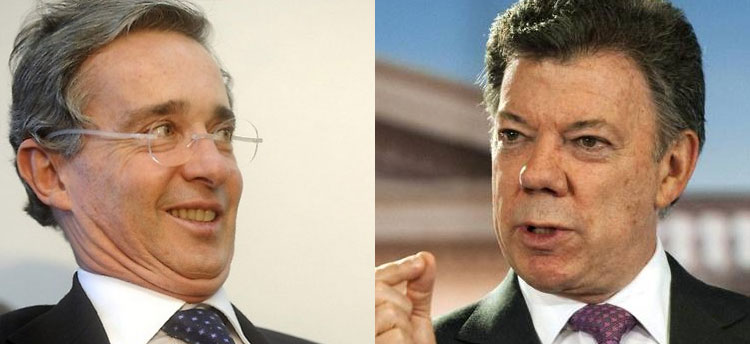Colombian President Juan Manuel Santos caused indignation among political opponents after comparing supporters of former President Alvaro Uribe to neo-Nazis and calling to end polarization in one interview with BBC Mundo.
In the interview, Santos claimed that “this Democratic Center [party of Uribe] is basically the extreme-right, and converting into something I never imagined, a bunch of kids with black shirts trying to sabotage my campaign,” which could refer to the peace process or his electoral campaign for reelection in the May 25 election.
“This is a type of neo-Nazism, or neo-Fascism, which only causes polarization and hatred,” the president added.
In the same interview Santos claimed to be trying to “eradicate this hatred, this spite, this polarization. Because of this I am working to obtain peace” with rebel group FARC.
Uribe responded on Twitter, clarifying that the black shirts worn by supporters at a protest in the southwestern city of Popayan had been put on as an expression of sorrow over the deaths of members of the security forces.
Masacres de Farc no importan al Pte Santos que ofende a jóvenes del Cauca de luto por asesinatos a nuestros policías pic.twitter.com/C3ohen82zP
— Álvaro Uribe Vélez (@AlvaroUribeVel) April 23, 2014
Uribe’s son Tomas retweeted a message by the youth organization itself, Alianza Futuro, in which it reject any association with far-right or neo-nazi movements.
“Our demonstration was an expression of popular dissent and the color black of our clothes were a symbol of mourning for the policemen, soldiers and civilians who are being killed in part by the narcoterrorist group FARC while negotiating [a peace treaty] with the government led by Juan Manuel Santos,” Juan Camilo Revero of the foundation said.
“color negro de nuestra vestimenta era un símbolo de luto por policías, militares y civiles asesinados por Farc” http://t.co/isC8HZBMHs
— Tomas Uribe Moreno (@tomasuribeEco) April 23, 2014
According to the group, instead of a peace accord, the FARC and the government are negotiating “the future of Colombia’s democratic institutions and the impunity of the FARC.”
Santos told the BBC that protest groups like that of Revero are part of a “dirty war” against the peace talks held in Havana, Cuba seeking the end of a 50-year long war of the rebel group against the State.


